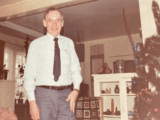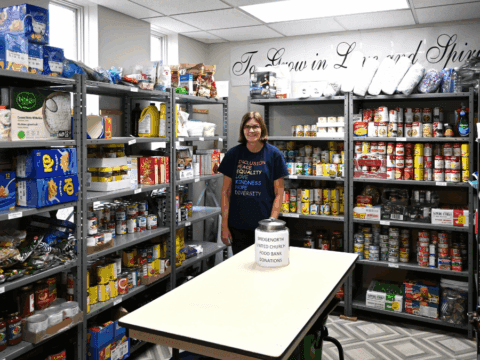Dorothy Ellen Palmer is currently writing a regular digital column for Broadview while in isolation during COVID-19.
Over half a century ago, when I was a little girl singing my heart out in the Alderwood United choir, my favourite hymn had a foot-stomping chorus: “We have an anchor that keeps the soul/ Steadfast and sure while the billows roll…”
You may unsubscribe from any of our newsletters at any time.
Today, I’m a disabled senior who lives alone in a tiny apartment. After weeks of total self-isolation in an attempt to keep myself safe from the coronavirus, I find myself thinking about what will anchor us in the days ahead, “when the clouds unfold their wings of strife.”
I also want to dream of a future beyond this crisis. With informed hope, I believe the ethical values of community care can weather the difficult days ahead and anchor the kind of world we want to build when the storm subsides. Every night, before I go to bed, I set myself one small goal of community care to be accomplished by noon the next day.
More COVID-19 coverage on Broadview:
Food bank scrambling during COVID-19 pandemic
Amid COVID-19, my church is proving it’s more than a building
The challenge of making editorial decisions in a pandemic
Today’s goal was to accept my prescription delivery in an ethical way that best protected all involved. I had already asked my doctor to prescribe as much of my meds as I could afford, six months, to minimize the times an overworked, underpaid delivery person would have to risk coming to my door. I paid by credit card when I phoned the pharmacy, so no one would have to touch an Interac machine. To maintain social distancing, I taped the most generous tip I could afford beside the door.
When the pleasant young delivery person arrived, I unlocked the door and moved two metres away. Thanking him profusely for risking his life to save others, I asked him to please drop the bag on my foyer floor and take his tip. My meds will sit there untouched for the full three days that the virus can live on plastic. Only then, will I put them away.
I’m hoping this kind of diligent, practiced care for my community will anchor me in the days ahead. As a disabled senior with many factors that put my life and care at risk, I freely admit that I’m still terrified. I’m hoping that facing my fears as ethically as possible will make them easier to bear. As this crisis stretches into months, we will all need collective care. To save the most lives, we will need to replace self-reliance with relying on each other.
When I look for role models of a lifetime of self-sacrifice and collective care, I see my grandmothers. They lived through the fear and loss of the First World War as children, became young mothers sharing Victory Gardens and make-do recipes in the Great Depression, and then sent their beloved children off to the Second World War. To paraphrase that hymn, “when the strong tides lift, and the cables strain,” we can all draw strength from their committed example and work together to ensure our values won’t drift, but “will firm remain.”
Broadview is an award-winning progressive Christian magazine, featuring stories about spirituality, justice and ethical living. For more of our content, subscribe to the magazine today.














And when this pandemic is done you can sing Andrae Crouch’s song: “Through it all”